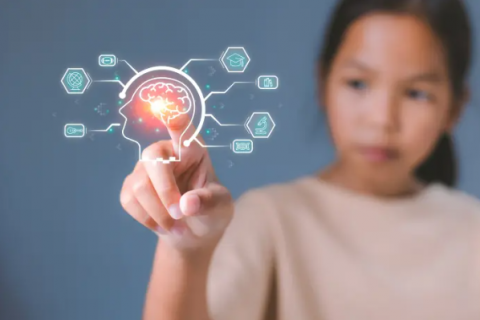
GCED Basic Search Form
Quick Search
Вы здесь
Новости

Regional webinar stresses how collaboration among educators, policy-makers, and technology developers is key to attaining equity in education with AI initiatives.
The UNESCO Regional Office in Bangkok (UNESCO Bangkok), in collaboration with the Equitable Education Fund (EEF) of Thailand, organized the webinar, ‘Artificial Intelligence for Equity in Education’ (‘AI for Equity’), to delved into the transformative potential of artificial intelligence in revolutionizing educational practices – expressly to ensure equitable access to education and related opportunities for all students in Asia and the Pacific.
The AI for Equity webinar, which engaged well over 1,200 participants, was facilitated by Dr Romora Edward Sitorus, Head of Evaluation, Research, Dissemination and Advocacy, of the Project Management Office (PMO) of Kartu Prakerja, Indonesia. The webinar featured presentations by three experts currently working with AI-driven learning platforms, or engaged with AI issues such as AI literacy and the critical importance of teaching the responsible use of AI in all educational contexts: Sajid Ali Anjum, Chief Technology Officer at Knowledge Platform; Asst. Prof. Ben Leong, Director of the AI Center for Educational Technologies (AICET), Singapore; and Pam Vachatimanont, Director of Operations and Partnerships for the non-profit AI and education advocacy platform, TeachAI. Closing remarks for the webinar were provided by Mr Ilja Riekki, Junior Professional Officer, Education Section of UNESCO Headquarters, Paris.

In his opening remarks, Dr Sitorus emphasized the vast potential of AI to revolutionize education by increasing access to quality education through virtual tutors, the creation of multilingual content, and the streamlining of operational processes – thus allowing educators to focus more on teaching. He shared the successful implementation of AI in Indonesia’s Prakerja platform, highlighting the platform’s capacity to provide personalized training, job recommendations aligned with students’ completed training, and AI-driven ‘liveness’ checks.
One of the overarching strengths of the webinar was its discussion of dynamic AI tools already blazing new trails for teaching in the region. In underscoring the critical shortage of qualified teachers in many contexts, Asst. Prof. Leong discussed how AI could assist the education sector with AI-driven programming ‘coaches’, such as ‘Codavari’, a tool providing access to quality learning support for students who might be lacking access to traditional classroom instruction. Another such AI platform introduced by Professor Leong was ‘Cikgo’, an AI tool developed by the AI Center for Educational Technologies (AICET), Singapore, which is designed to personalize learning experiences for students by adapting to their individual needs. He stressed that the goal of AI should be to support teachers and enhance their capacity to manage larger classes effectively.

Mr Sajid Ali Anjum shared similar insights into the benefits of AI for personalized learning and content creation. He discussed how certain resources such as ‘Knowledge Platform’ are already serving millions of learners by providing AI-driven personalized learning paths and content creation tools. Anjum shared a case study from Pakistan, where the implementation of AI-driven personalized learning recently led to a substantial improvement in student performance. In a pilot program involving 75 schools and 26,000 learners, the personalized learning approach resulted in a 60 per cent improvement in student scores.

Ms Pam Vachatimanont focused on AI literacy and its importance in bridging the digital divide, emphasizing that AI literacy should encompass an understanding of how AI works, what constitute its societal impacts, and how it is to be used responsibly. She shared examples of initiatives at the youth-serving NGO Prestasi Junior Indonesia, and Kyungpook National University (KNU), South Korea, which have successfully integrated AI literacy into their educational frameworks for a balanced and informed use of AI. For instance, aiming to foster responsible use of technology among students, Prestasi Junior Indonesia developed a STEM education programme which includes AI and machine learning courses. Similarly, KNU’s AI Convergence Education major equips future teachers with the knowledge to design AI-integrated curricula and teach AI literacy. These initiatives ensure that all students, regardless of their background, have the opportunity to learn about and benefit from AI technologies.

The session concluded with a Q&A session and closing remarks offered by Ilja Riekki, Junior Professional Officer, who specializes in Youth Literacy and Skills Development for the Education Section of UNESCO Headquarters. Riekki introduced the UNESCO Global Skills Academy, which aims to enhance employability and resilience by providing digital skills training as a solution to bridge the skills gap. He shared information about the academy's digital skills offerings and extended an invitation to World Youth Skills Day 2024 (15 July) event, which focused on AI skills for the future of work.
For more information:
- Use of AI in education: Deciding on the future we want
- Generative AI and the future of education
- How generative AI is reshaping education in Asia-Pacific
- Youth Skills for Peace and Development
- Equity Ed Hub
#EquitableEducation #FutureOfEducation
